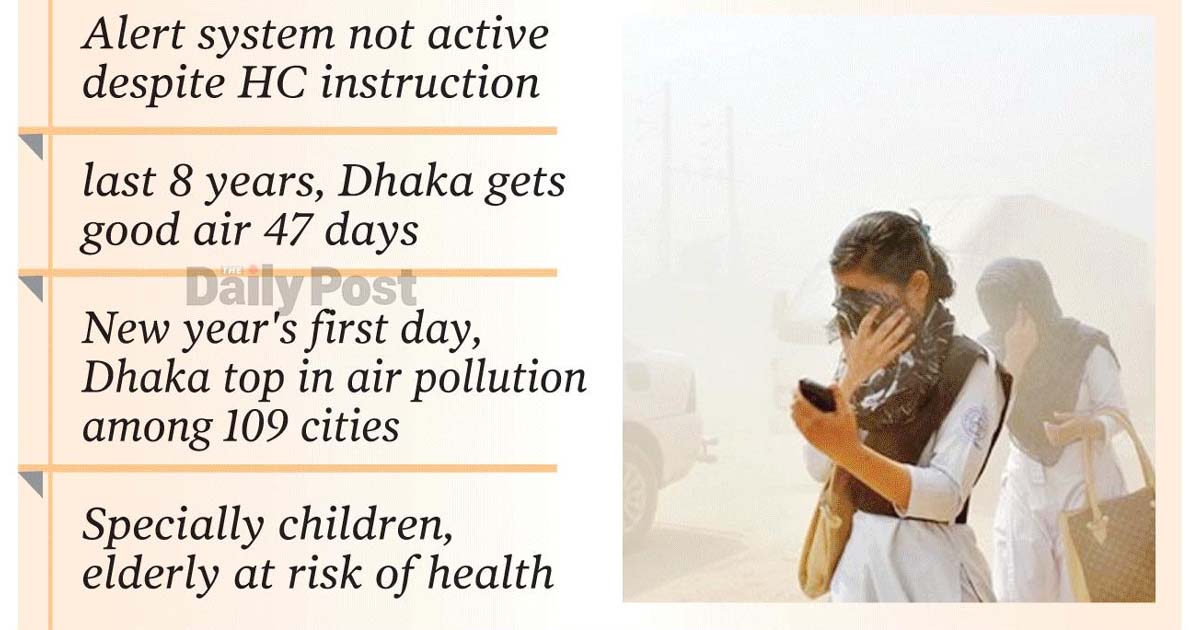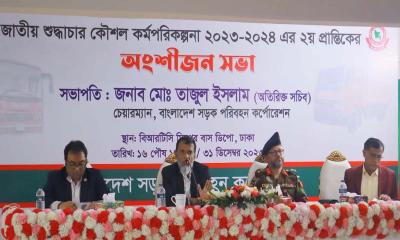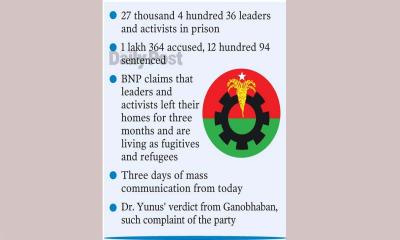- last 8 years, Dhaka gets good air 47 days
- New year's first day, Dhaka top in air pollution among 109 cities
- Specially children, elderly at risk of health
In the last 8 years, the people of Dhaka have been able to get good air for only 47 days. During this period, 598 days received moderate quality air, 778 days cautionary, 683 days unhealthy, 541 days very unhealthy and 55 days received 'disastrous air'. This information has emerged from the study of the Center for Atmospheric Pollution Studies (CAPS) of Stamford University. On Monday, the first day of the new year, Dhaka was at the top in air pollution among 109 cities in the world. The air quality in Dhaka at 8 pm that day was 300, which is disastrous. In such situations, other countries of the world issue emergency health warnings to reduce health risks. Educational institutions were closed. However, no warning has been issued for even one day due to air pollution in Bangladesh.
The High Court's instructions to launch a warning or alert system to protect the people of Dhaka, the recommendation of the parliamentary committee and the call of environmentalists - the Department of Environment is not paying attention to anything. Meetings and seminars, distributing leaflets and putting up signboards, they are completing the responsibility. And a lot of money is being spent on it. According to the World Health Organization and the US Environmental Protection Agency (EPA), a city with an air quality index (AQI) of 200 is considered unhealthy. This can affect the health of every city dweller, especially children, the elderly and the sick. If the index is 201 to 300, it is considered an emergency. In this situation, children, elderly and sick patients are advised to restrict activities inside the house and others outside the house. Dhaka's air quality ranges from unhealthy to hazardous for five months of the year. Other countries issue emergency health warnings in such situations. Bangladesh Environmental Law Association (BELA) filed a public interest case in the High Court to control Dhaka's air pollution. Hearing the case, the High Court on February 15, 2022 directed to identify the major sources of air pollution and formulate action plans to reduce it and launch an alert system to protect the public from unhealthy air.
According to Rule 13(5) of the Air Pollution (Control) Rules 2022, the Environment Department will issue warning messages to the public if the level of air pollution increases. Advise on necessary health protection. These rules mention the constitution of National Committee on Air Pollution Control. The committee will advise the government to impose caution on public movement only if the air quality is unhealthy. It will direct the imposition of restrictions on any source of air pollution. Even in almost two years, that directive was not implemented in the court. In March 2019, a meeting of the Parliamentary Standing Committee on Ministry of Environment, Forest and Climate change recommended the issuance of a health alert if the air pollution level rises above 300. On December 28, BELA wrote to the Department of Environment to start an alert system to protect the people of Dhaka from the dangers of air pollution. But the Department of Environment is not paying attention to anything. However, last year, the Department of Environment took a project of Tk 3 thousand crore to check the air quality and set up an alert system to ensure a healthy environment. According to the Department of Environment, the government spent at least 6.50 crore US dollars on two projects from 2000 to 2019 to combat air pollution. Bangladesh has also received huge funding for projects that help prevent air pollution. According to the report published in the world's influential magazine Lancet, Bangladesh has received about 200 crore dollars in financing for such projects from 2017 to 2021, which is equal to about Tk22 thousand crores at the current exchange rate. The National Committee on Air Pollution Control was formed in November last year to take coordinated initiatives.
The 29-member committee has 14 secretaries including the Cabinet Secretary and the Director General of the Department of Environment. The notification of the formation of the committee said that if the level of air pollution is very unhealthy, the committee will recommend the issue of warning. However, in the last one year, no advice like warning or restrictions has come from this committee. The second meeting of the committee was held on November 19 last year. In that meeting, air pollution quality promotion program was inaugurated in real time automation system including Dhaka.
Professor Ahmad Kamruzzaman Majumder, founder and director of the Center for Atmospheric Pollution Studies (CAPS) at Stamford University said, countries with weaker economies than us are issuing regular warnings. But despite having all the capabilities, Bangladesh is not being alerted. The Department of Environment is supposed to provide technical assistance in this regard. However, they may not be issuing warnings keeping in mind whether pollution will spread bad reputation or panic among the people. Syeda Rizwana Hasan, chief executive of BELA, said that the relevant government institutions considered the warning to be their failure. Basically they are not issuing warnings to cover this failure. They are recently providing air quality on the website; But people will not understand it. How many people visit the website? If the alert is not issued, the number of people affected by air pollution will continue to increase. Failure to activate the alert system also amounts to contempt of court.
In this context, Director General of Environment Department Dr. Abdul Hamid said that those responsible for air pollution are being fined across the country. People are being made aware. Meetings have been held with various ministries and departments to issue health warnings and free people from air pollution. A quick decision can be made in this regard.
ARS










